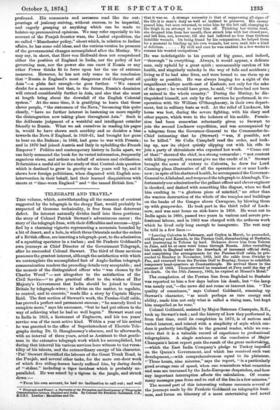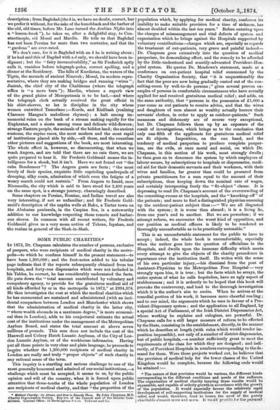TELEGRAPH AND TRAVEL.* Tins volume, which, notwithstanding all the romance
of contrast suggested by the telegraph in the sleepy East, would probably be suspected of tiresome technicality, is free from that deterrent defect. Its interest naturally divides itself into three portions; the story of Colonel Patrick Stewart's adventurous career ; the story of the telegraph lines, with their difficulties and success—typi- fied by a charming vignette representing a mountain bounded by a bit of desert, and a hole, in which three Orientals under the orders of a British officer, are inserting a telegraph-post, to the admiration of a squatting spectator in a turban ; and Sir Frederic Goldsmid's own journeys as Chief Director of the Government Telegraph, after he succeeded Colonel Stewart. The third of these sections possesses the greatest interest, although the satisfaction with which we contemplate the accomplished fact of Anglo-Indian telegraph communication renders the preceding details very acceptable ; and the memoir of the distinguished officer who " was chosen by Sir Charles Wood " not altogether to the satisfaction of the Civil Service—" to give practical effect to the wishes of Her Majesty's Government that India should be joined to Great Britain by telegraph-wires ; to advise on the matter, to regulate, to control, and to execute," reads like a story by Captain Mayne Reid. The first section of Stewart's work, the Persian-Gulf cable, has proved a perfect and permanent success ; "he scarcely lived to complete more," says his successor, "but he had put others in the 'way of achieving what he had so well begun." Stewart went out to India in 1852, a lieutenant of Engineers, and his ten years' service was of the most active kind. Within a year of his arrival he was gazetted to the office of Superintendent of Electric Tele- graphs during Dr. 0. Shaughnessey's absence, and he afterwards, with an interval of three years, acted as Assistant to that gentle- man in the extensive telegraph work which he accomplished, but during that interval his various services bore witness to the versa- tility of his talents, and the extraordinary energy of his character. 'Pat' Stewart diversified the labours of the Great Trunk Road, in the Punjab, and several other tasks, for the mere out-door work of which five riding-horses barely sufficed him, by daring deeds of " shikar," including a tiger incident which is probably un- paralleled. He was seized by a tigress in the jungle, and struck down:
"From his own account, he had no inclination to call out ; and well Telegraph and Travel : a Narrative of the Formation and Development of Telegraphic Communication between England and India. By Colonel Sir Frederic Goldsmid, C.B., M.C.S.I. London : Macmillan and Co. that it was so. A strange necessity is that of suppressing all signs of the life it is man's duty as well as instinct to preserve. His enemy passed him, but soon, returned, to seize him by the left calf, changing to
thigh in an attempt to carry him off. Thinking her victim dead, she dropped him from her mouth, then strack him with her closed paw, and left him, not however, till she had inflicted no less than thirteen indelible wounds. On being found by his companions, he helped them for a moment in binding up his own wounds, but soon sank into a kind of delirium By skill and care he was enabled in a few weeks to resume his wonted occupations."
He was indefatigable in his pursuit of big game, and indeed, " thorough " in everything. Always, it would appear, a delicate man, only upheld by a great spirit ; unreasonably careless of his health, and singularly unlucky in the way of falls and accidents ; living as if he had nine lives, and were bound to use them up as quickly as possible. He was always longing for a sight of the magnificent valleys north-east of Kashmir, not only for the sake of the sport ; he would have gone, he said, "if there had not been an animal in the whole country." During the Mutiny, he dis- tinguished himself, not only by the services he performed, in co- operation with Sir William O'Shaughnessy, in their own depart- ment, but in military feats as well. At the relief of Lucknow, his horse was lost, during the severe fighting, with his diary and
other papers, which were in the holsters of his saddle. Permis- sion had been somewhat reluctantly given to Stewart to join the second Luckmow expedition, and was accompanied by a telegram from the Governor-General to the Commander-in- Chief intimating that he (Stewart) "was, if possible, not to be killed." Sir Colin Campbell read the order, and look- ing up, saw its object quietly slipping out with his rifle to- join a party of skirmishers who expected hot work. " Come out of that!" shouted the chief, in a strong vernacular ; 4' not content with killing yourself, you must give me the credit of it." Stewart brought the news of victory to Calcutta, he drew for Lord. Canning plans illustrative of all the operations at or near Luck- now ; in spite of his shattered health, he accompanied the Governor- General to Allahabad, and reopened the telegraph to Alambagh. Un- fortunately our admiration for the gallant officer and clever engineer- is 'checked, and dashed with something like disgust, when we find him exulting in " a glorious piece of mischief," no other than the wanton destruction of the whole of the temples and buildings on the banks of the Ganges above Cawnpore, by blowing them up with gunpowder. He took part in the third relief of Luck- now, and was sent home on sick-leave in 1858. He went out to India again in 1860, passed two years in various and severe pro- fessional labour, and in 1862 was charged with the arduous work which he lived only long enough to inaugurate. The rest may-
be told in a few lines :—
"Leaving Calcutta in February, and Ceylon in March, he proceeded,. yid Bombay and Karachi, to the Persian Gulf, disembarking at Bushehr, and journeying to Tehran by land. Sickness drove him from Tehran in June, and he at once went home through Russia. After recruiting his health in England under the drawback of incessant official duty, and completing the arrangements for the Persian-Gulf cable, he pro- ceeded to Bombay in November, 1863, laid the cable from Gwadar to Fao, and returned from the Persian Gulf to Bombay, thence to establish temporary head-quarters at Constantinople. He arrived there in the summer of 1864. Thenceforward he remained at Pera until the day of his death. On the 16th January, 1865, he expired at Mieseri's Hotel."
The completion of the. Persian line from Baghdad. to Bushahr was reported to him a few days before his death, but "the lamp was nearly out,"—the news did not rouse or interest him. " The quality of conscience," says Colonel Goldsmid, summing up Stewart's character, " as much perhaps as rare energy and ability, made him not only what is called a rising man, but• kept him unspoiled as he rose."
Colonel Goldsmid, assisted by Major Bateman Champain, R.E., took up Stewart's task ; and the history of how they performed it, from that time, until its completion in 1870, is of serious and varied interest, and related with a simplicity of style which ren- ders it perfectly intelligible to the general reader, while we con- ceive that it is a valuable record of experience to professional telegraphists. A single sentence at the conclusion of Major Champain's latest report puts the result of the great undertakny, —which the East India Company's pledge to Turkey imposed on the Queen's Government, and which has received such vast development,—with comprehensiveness equal to its plainness. " Three hours, nine minutes," says the report, " is a particularly good average rate of speed, when one remembers what countries and seas are traversed by the Indo-European despatches, and how any important interruption affects the calculation. Of course many messages pass from end to end of the line in a few minutes." The second part of this interesting volume recounts several of the journeys made by Sir Frederic Goldsmid on telegraphic busi- ness, and forms an itinerary of a most entertaining and novel
description ; from Baghdad (the his, we have no doubt, correct, but we prefer it without, for the sake of the hunchback and the barber of the old, old times, before Mr. Lane turned the Arabian Nights into a "lesson-book "), he takes us, after a delightful stay, to Con- stantinople, via Mosul and Mardin. He tells us that Baghdad has not been Persian for more than two centuries, and that the at gardens" are over-rated.
We don't care, for it is Baghdad with an h he is writing about ; if he had said this of Bagdad with a d only, we should have been in- dignant; but the "fairy inconceivability," as Sir Frederick aptly calls it, vanishes before telegraph-poles, correct spelling, and a dinner at the Residency. The hills of Kurdistan, the waters of the Tigris, the mounds of ancient Nineveh ; Mosul, its modern repre- sentative, where they are making bridges and running "wires " ; Jazirah, the chief city of the ChaldEeans (where the telegraph office is " a mere barn ") ; Mardin, whence a superb view of the grand plains of Mesopotamia is to be had,—and where the telegraph clerk actually received the great official in his shirt-sleeves, so lax is discipline in the city whose women outwitted Tamerlane ;—Kurds, and Kiailbash (realising Clarence Mangan's melodious rhymes) ; a halt among im- memorial ruins on the bank of a stream making rapidly for the Euphrates, and a siesta among roses and delicate wild-flowers ; strange Eastern people, the animals of the hidden land; the ancient customs, the supine races, the most modern and the most rapid of institutions placed side by side,—all these, and the countless other pictures and suggestions of the book, are most interesting. The whole effect is, however, so disconcerting, that when we reach Angora, and are told that there are no cats there, we are quite prepared to hear it. Sir Frederic Goldsmid means the in- telligence for a shock, but it isn't. Have we not found out " the calm Bendemeer " ? The Angora goats are facts ; " the most lovely of their species, exquisite little caprioling quadrupeds of drooping, silky coats, admiration of which even the fatigue of a weary march could not restrain." From Angora to Ismid, once Nicomedia, the city which is said to have stood for 2,400 years on the same spot, is a strange journey, charmingly described.
Some chapters on Persian, Russian, and Indian travel are also very interesting, if not so unfamiliar ; and Sir Frederic Gold- smid's description of the naptha wells at Baku, a Tartar town on the Absharan peninsula, in the Caspian Sea, is a noteworthy addition to our knowledge respecting those remote and barbar- ous shores. In common with all recent writers, Sir Frederic 'Goldsmid gives us a very mean notion of Tehran, Ispahan, and the realms in general of the Shah-in-Shah.



































 Previous page
Previous page